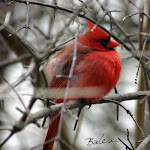 |
| Todd Witcher, WVLT's Alan Williams and Doc with his care-giver |
This morning we were the guests of Todd Witcher, Executive Director of Discover Life in America and interviewed by Knoxville's own Alan Williams on WVLT-TV. It was Doc's first time on TV but he was smooooth!
Doc is a non-flighted, state-permitted male American kestrel that was brought into the University of Tennessee Veterinary Hospital last January. He had a badly broken and infected right wing and sadly, will never fly again. He was treated by Dr. Cheryl Greenacre and it was the Doc's good care that brought him to me after he spent time on antibiotics with local wildlife rehabilitator Lynne McCoy.
Doc is now a wildlife ambassador for the State of Tennessee under my care and state education permit. He makes routine public appearances to raise awareness of kestrels and their current status in the wild.
Weighing only 4 ounces, kestrels are the smallest falcon that lives in the Americas.
The kestrel subspecies (Falco sparverius paulus) found in the American Southeast has suffered a population decline of 83 percent since 1940 and no one is completely sure why but many grassland birds are dropping in population. Habitat loss and pesticide usage undoubtedly play a role. Species like northern bobwhite, eastern meadowlark, grasshopper and field sparrows, horned lark, snowy and short-eared owls are all declining, having lost well over 60 percent of their numbers in the past 40 years.







































































No comments:
Post a Comment